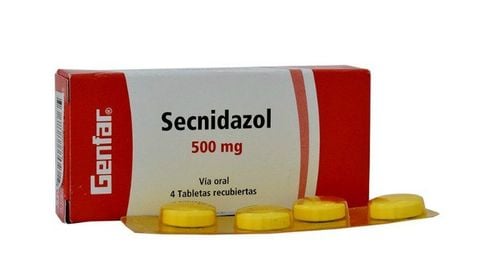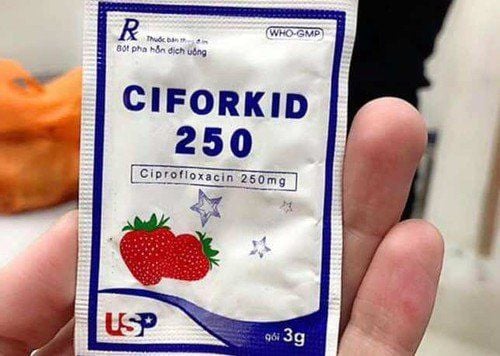This is an automatically translated article.
Dysentery is an infection of the large intestine caused by bacteria or anaerobic dysentery. Most infections are in the form of asymptomatic carriers, some mild persistent or severe diarrhea is fulminant dysentery. So how to treat dysentery in adults like?
1. What is dysentery?
Dysentery is an intestinal infection that causes severe diarrhea with blood or mucus in the stool. Diarrhea can last from 3 to 7 days. Most dysentery is caused by bacteria or anaerobic dysentery, such as: Shigella, Campylobacter, Salmonella, or the intestinal bacteria E. coli.
Possible symptoms such as: Abdominal pain or cramps, nausea, vomiting, high fever, dehydration, headache, fatigue, weight loss,... can be life-threatening. patient if not treated promptly. The symptoms mentioned above include high fever and abdominal cramps and can last up to 4 - 8 days. Severe cases can last from 6 to 8 weeks and sometimes it can take only 3 days for a person to recover.
The main cause of dysentery is poor hygiene such as: Eating contaminated food, contaminated water, people with dysentery do not wash their hands properly, swimming in contaminated water, body contact with sick people,...
2. How dangerous is dysentery to health?
Because dysentery is a contagious disease and is highly contagious upon first contact, if not treated promptly can cause complications and possibly death. Here are some complications that dysentery can cause such as:
Infectious arthritis: About 2% of people have this condition. In addition, the patient may experience joint pain, painful urination, eye irritation, and pain, especially in the joints, making the patient very painful. Arthritis can last for months or years. Sepsis: This is rare and people with weak immune systems, HIV infection, cancer, etc. are more likely to get sepsis than the general population. Convulsions: Common in young children causing generalized convulsions and this complication usually resolves on its own without treatment. Hemolytic uremic (HUS): Shigella bacteria, S. dysenteriae can cause hemolytic uremic syndrome. They work by producing a toxin that destroys red blood cells, preventing red blood cells from entering the kidneys, causing anemia, kidney failure, or a low platelet count. This is considered an extreme symptom of dysentery. Dehydration: Patients can experience vomiting, diarrhea, which is more common in children under 5 years of age and life-threatening when dehydrated. Other serious complications: Dysentery can lead to liver abscess or parasites that spread to organs such as the lungs and brain.
3. How to cure dysentery
People with mild dysentery are often treated with plenty of fluids, rest, and an over-the-counter medication such as bismuth subsalicylate (Pepto-Bismol) that can help relieve abdominal pain and diarrhea. In contrast, people with severe dysentery are usually treated with antibiotics. In case the patient has been using antibiotics for 6 days and the symptoms are still not relieved, it is possible that the bacteria have become accustomed to the antibiotic, so it should cause resistance, it is necessary to consult a doctor and get tested. blood test immediately.
Dysentery is usually treated with drugs such as metronidazole and tinidazole with the aim of killing the parasites. If the condition is severe, the doctor may give the patient an intravenous infusion to replace liquid food, to prevent dehydration.
4. Home remedies for dysentery
The best way to prevent dysentery is to use hygienic foods, especially when visiting areas with sick people. Here are some simple home remedies and treatments for dysentery to protect yourself and your family from this disease:
Drink at least two glasses of fresh orange juice, fresh lemon every day Add bananas to your diet portion, because bananas will help soften stools and mold properly. Drink a mixture of honey, milk and lemon together or drink black tea. Recommended use, drink mineral water or cooled boiled water. Only eat foods that are thoroughly cooked. Wash your hands with soap, especially after using the toilet. Do not swallow water while swimming. Avoid drinks with ice, bottled, carbonated,... Fruits or vegetables should be peeled. Avoid unpasteurized yogurt or dairy products. Patients with acute dysentery should choose light, soft, liquid, easily digestible, non-greasy, low-residue, nutritious, non-stimulating dishes. The main food can choose plain rice, lotus seeds, glutinous rice, noodles, ground tubers, barley, chickpeas, young beans, mung beans, etc. When the patient has a lot of bowel movements, thick porridge can be eaten. Need to eat less, divided into many meals. Fresh fruits and vegetables can be crushed or pressed to drink. In addition, you can use garlic, lotus root, tea leaves, guava ... these are all foods that have certain bactericidal effects and can be used. People who lose a lot of water due to going to the toilet can drink more salt and sugar water for several times. Processing foods such as dandelion, apricot leaves, and purslane into soups or porridge, which do not contain fat to eat, will help a lot when suffering from dysentery. The above article is information about dysentery and effective ways to treat dysentery in adults. Patients who have dysentery for many days and tend to get worse should visit another doctor for timely examination and treatment.
Please dial HOTLINE for more information or register for an appointment HERE. Download MyVinmec app to make appointments faster and to manage your bookings easily.













